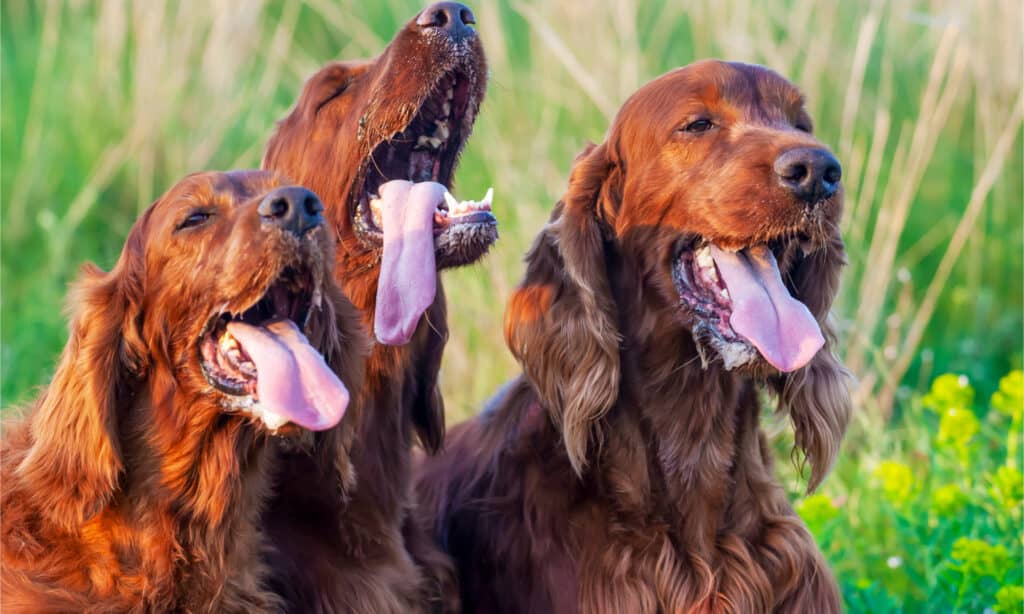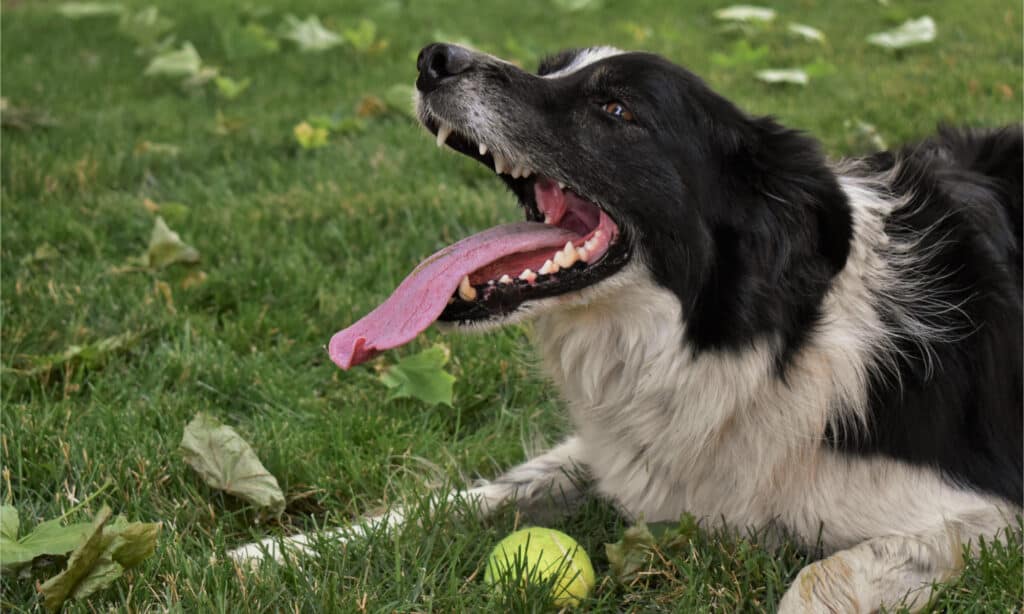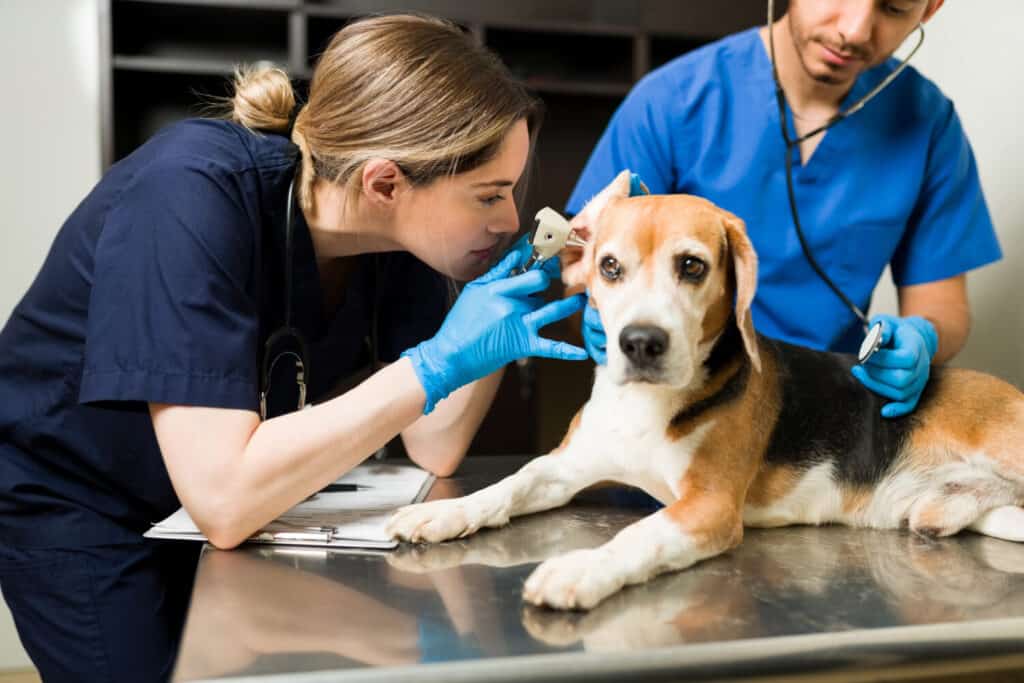Panting is such a common behavior for dogs that we just accept it and don’t pay it much attention. But, why do dogs pant?
The main reason dogs pant is to make themselves feel cool during hot weather. There are other reasons as well. For example, your dog may be sick and may need medical attention. This behavioral practice is discussed in greater detail in the paragraphs below.
What Is Panting?
Panting is when a dog breathes fast, with its mouth open and often with its tongue hanging out. It is perfectly normal dog behavior and is seen in dogs of all ages including puppies.
Dogs barely sweat and panting is their mechanism for cooling down. As the liquid evaporates from their tongue, it lowers the surface temperate and therefore cools the blood flowing through this area of the body. This in turn decreases the dog’s core temperature. At the same time, hot air is breathed out rapidly from their lungs and cooler air is breathed in. This also has a cooling effect on their core temperature.
Panting is not the same thing as labored breathing. A panting dog should not be struggling to breathe. If your dog is simply panting, you will not hear any whistles or crackling from their respiratory system and they will not appear distressed by crying or whining.
Why Do Dogs Pant?
While panting is a perfectly normal aspect of canine behavior, it can have several causes. Some are nothing to worry about but others indicate that your dog is unwell and needs to see a vet. Here are some of the less worrying causes of panting in dogs.

Dogs pant to cool off since they only have sweat glands on their paw pads, not throughout their bodies like humans.
©Reddogs/Shutterstock.com
To Cool Down
If your dog is panting, the most likely explanation is that they are hot. It is also a natural thing for them to do if they have been running around. Whilst humans will breathe heavily and sweat after hard exercise, a dog will pant – it’s like a combination of breathing heavily and sweating for them.
Dogs do have some sweat glands but they are only on their paw pads. This is nowhere near enough to cool down a hot dog! The problem is that panting is not that great as a cooling-down mechanism. So, it kicks in even before your dog is very hot. This is especially true for the brachycephalic breeds who have very short noses with hardly any surface area available to cool them down.
You will notice that the hotter your dog becomes, the more intensely they pant. Eventually, this changes from normal behavior into signs of over-heating and we explain how you spot this below.
Excitement
Excitement is not always as pleasant for dogs as it is for humans. When canines are described as being excited, it can be for a good reason. It could be the anticipation of tasty treats or it could be because they have spotted the leash in your hand and think that they are going for a walk. However, it can also be negative excitement such as that caused by stress, fear, and anxiety.
This type of panting is usually shallow and rapid and dogs often fuss and whine at the same time. It is usually easy to spot this type of whining because it will have an obvious cause. Also, dogs that are stressed have wide eyes and may look away from you and yawn.
They Want to Play
Dogs also pant when they are happy! This type of panting is very easy to spot because the rest of your dog’s body language will show their joy. Look out for a wagging tail, relaxed facial features, and bright eyes. Once the game is over and your dog relaxes again, the panting will soon stop.

Dogs pant when they’re excited and want to play.
©Diane Isabel/Shutterstock.com
The Difference Between Normal and Excessive Panting
So far, we have considered normal causes of panting that are perfectly harmless. Sadly, some causes of panting are more dangerous. But how can you tell the difference? Let us explain how you can spot that things are not right when your pooch is panting.
What was your dog doing when the panting started?
If your dog was running around just before they started panting, exercise is the most likely explanation. If it is a hot day, it is most likely that they are trying to cool down. If you have a visitor or if you have just given them a new toy, it is probably excitement.
On the other hand, if your dog is resting or sleeping and is panting or breathing rapidly, this is more worrying.
Are there any other symptoms?
If panting is a sign that something is wrong, it is usually accompanied by some other signs. Has your dog stopped eating or drinking? Are they vomiting? Have they got a cough or are they lethargic? This indicates that the panting is not normal.
What does the panting sound like?
Abnormal panting rarely sounds like normal, healthy panting! There is a condition called Laryngeal paralysis that causes a harsh type of panting. It affects the vocal cords (which do not open properly) and is most common in Labradors and Golden Retrievers. Also, the brachycephalic breeds like Pugs make a snorting sound when they are panting. These breeds struggle to cool themselves down and need to be monitored closely when they start to pant.
Does it sound normal for your dog?
You spend more time with your dog than anyone else. You know what their normal, regular panting sounds like. Most dogs breathe in between 10 and 30 times a minute. If their panting is a lot different to anything you have seen them doing before, it could be a sign that something is wrong.
Causes of Excessive Panting
So, if you suspect that your dog’s panting is not a response to being a bit hot or excited, what else could it be. Here are some of the more worrying causes of panting in dogs.
Heatstroke
Normal panting to cool down in the heat can develop into heatstroke if a dog gets too hot. Heatstroke is a dangerous condition and requires immediate medical attention. Dogs with heatstroke do not move around, they drool excessively, vomit, have diarrhea, and often collapse.
You can prevent heatstroke by preventing your dog from running around on a hot day. Instead, encourage them to rest in a cool place. Take them for a walk first thing in the morning when it is cooler. Never leave your dog unattended in a car.
Poisoning
Dogs that have ingested a poisonous substance often pant. They also usually appear agitated, have vomiting and diarrhea, and may also have convulsions and tremors. You may realize that your dog has been poisoned because you have seen them eating something that they should not. Some human foods (including chocolate) are poisonous to dogs. Dogs with poisoning need to be seen by a vet.
Pain or injury
You need to look out for signs that your dog is in pain because they cannot tell you. As well as heavy panting, they may have large pupils, refuse to lie down, and appear restless. They may also be off their food and seem to be obsessed with one part of their body. This is probably the origin of the pain. Some dogs try to hide that they are in pain and carry on wagging their tails but most are quite sensitive and it is obvious that something is wrong. Your vet needs to investigate the source of the pain.

A veterinarian examines a beagle
©Beach Creatives/Shutterstock.com
Reaction to a Medication
If your dog is taking some medication, panting could be a side effect. Prednisone is used to treat arthritis in some dogs and it can trigger heavy panting. Always report this to your vet.
Diseases and Conditions
Some diseases and medical conditions can also cause excessive panting. Here are some examples:
- Eclampsia. This is also called Milk Fever and affects female dogs that are nursing pups. It requires veterinary treatment.
- Low calcium levels. This leads to problems with walking and shaking. You can prevent this by feeding your dog a balanced food with plenty of minerals.
- Allergies. Dogs can have allergic reactions to something they eat or things in their environment. Talk to your vet about transitioning your dog onto a special food for dogs with allergies.
- Infection. Any part of the body can become infected. It causes a dog to have a high temperature and this can cause panting. Your vet needs to check this out.
- Airway irritation. Foreign bodies or chemicals can cause irritation of the airways which can cause panting and wheezing. This may be preceded by sneezing. Take your dog to the vet if they have these symptoms.
- Full stomach. Dogs with a very full stomach can pant just before they vomit. If your dog is eating too quickly, try a slow-feeder bowl to force them to eat slowly.
- Bloat. This is a condition where the stomach fills with gas or fluid and twists. It is more common in deep chested dogs like the Great Danes. It is a medical emergency and can be fatal.
- Cushing’s Disease. In this disease, the dog’s body produces too much of a stress hormone called cortisol. It needs to be treated by a vet.
- Heart failure. As well as panting, your dog will have difficulty breathing and will have a cough. This needs to be treated by a vet.
- Lung problems. Pneumonia and lung tumors can lead to heavy breathing or panting. See your vet about this.
What To Do When Your Dog Is Panting Heavily
All of the causes of excessive panting should be checked out by your vet. Some, such as heatstroke, are medical emergencies because they are potentially fatal.
If your dog is simply a bit hot, you should stop them from running around and get them to rest in a cool place. They need plenty of water in a water bowl or water fountain and a cooling vest will also help. For over-excitement, you could try some calming treats and for separation anxiety try some interactive toys to distract them. Some calming music can also help to soothe an anxious dog.
Observe your dog for a while to make sure that the panting calms down. If it goes on for too long or if there are any other symptoms, contact your vet for advice.
The photo featured at the top of this post is © Reddogs/Shutterstock.com
Ready to discover the top 10 cutest dog breeds in the entire world?
How about the fastest dogs, the largest dogs and those that are -- quite frankly -- just the kindest dogs on the planet? Each day, AZ Animals sends out lists just like this to our thousands of email subscribers. And the best part? It's FREE. Join today by entering your email below.
Thank you for reading! Have some feedback for us? Contact the AZ Animals editorial team.






